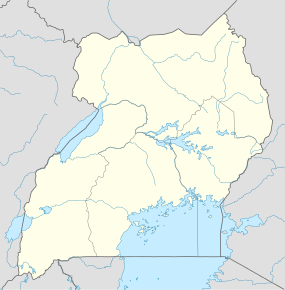Malaba, Uganda
| Malaba, Uganda | |
|---|---|
 Malaba, Uganda Location in Uganda | |
| Coordinates: 00°38′40″N 34°15′38″E / 0.64444°N 34.26056°E | |
| Country |
|
| Region | Eastern Region of Uganda |
| District | Tororo District |
| Elevation | 3,870 ft (1,180 m) |
| Population (2014 Census) | |
| • Total | 18,224[1] |
Malaba, Uganda is a town in Tororo District in the Eastern Region of Uganda, on its eastern border with Kenya. It sits adjacent from Malaba, Kenya, across the Malaba River that marks the border between Uganda and Kenya.[2]
Location
The town is on the main highway between Kampala and Nairobi, about 14 kilometres (9 mi) east of Tororo, the nearest large town and the location of the district headquarters.[3] This is approximately 215 kilometres (134 mi), by road, east of Kampala, Uganda's capital and largest city.[4] The coordinates of the town are 0°38'40.0"N, 34°15'38.0"E (Latitude:0.644444; Longitude:34.260556).[5]
Overview
Malaba is a busy crossing point between Uganda and Kenya. In 2013, it was the second-busiest border crossing between Uganda and Kenya, based on the volume of informal exports and imports.[6]
| Rank | Border Town | Share of Exports | Share of Imports |
|---|---|---|---|
| 1 | Busia | 85.7% | 68.7% |
| 2 | Malaba | 9.6% | 21.1% |
| 3 | Suam | 3.6% | 4.9% |
| 4 | Lwakhakha | 1.4% | 4.9% |
Population
The national census in 2002 estimated the population of the town at 7,600. In 2010, the Uganda Bureau of Statistics (UBOS) estimated the population at 9,200. In 2011, UBOS estimated the population at 9,500.[7] During the 2014 national population census, the population was enumerated at 18,224.[1]
One stop border crossing
In February 2015, work was completed on the one stop border post at Malaba, Uganda. The new building contains offices of the Uganda Revenue Authority, Uganda Customs, and Uganda Immigration Services. In these offices, Ugandan officers are joined by their counterparts from Kenya to clear customers who are exiting Uganda to enter Kenya. In a similar building, with similar provisions, on the Kenyan side, officers from both countries clear travelers leaving Kenya to enter Uganda.[8] This eases border formalities and reduces waiting times for travelers.
The project was funded by the World Bank, TradeMark East Africa, and the east African governments. The building at Malaba, Uganda cost UGX:15 billion. Similar arrangements have been mad at the Busia, Mutukula, Mirama Hills, Katuna, and Elegu border posts.[8]
See also
References
- 1 2 UBOS (29 November 2014). "The Population of The Regions of the Republic of Uganda And All Cities And Towns of More Than 15,000 Inhabitants". Citypopulation.de Quoting Uganda Bureau of Statistics (UBOS). Retrieved 26 February 2015.
- ↑ Nation Correspondent (24 October 2014). "In Malaba, the border provides escape route". Daily Nation. Nairobi. Retrieved 3 November 2016.
- ↑ Globefeed.com (3 November 2016). "Distance between Market Road, Tororo, Uganda and Malaba Uganda Immigration Offices, Malaba, Eastern Region, Uganda". Globefeed.com. Retrieved 3 November 2016.
- ↑ Globefeed.com (3 November 2016). "Distance between Kampala Road, Kampala, Uganda and Malaba Uganda Immigration Offices, Malaba, Eastern Region, Uganda". Globeeed.com. Retrieved 3 November 2016.
- ↑ Google (16 July 2015). "Location of Malaba, Uganda At Google Maps" (Map). Google Maps. Google. Retrieved 16 July 2015.
- ↑ BOU & UBOS (November 2014). "The Informal Cross Border Trade Survey Report 2013" (PDF). Kampala: Bank of Uganda (BOU) and Uganda Bureau of Statistics (UBOS). Retrieved 3 November 2016.
- ↑ UBOS (June 2012). "Estimated Population of Malaba, Uganda In 2002, 2010 & 2011" (PDF). Uganda Bureau of Statistics (UBOS). Retrieved 3 November 2016.
- 1 2 Waiswa, Baz (22 February 2015). "Uganda border at Malaba revamped". East African Business Week. Kampala. Retrieved 3 November 2016.
External links
Coordinates: 00°38′40″N 34°15′38″E / 0.64444°N 34.26056°E